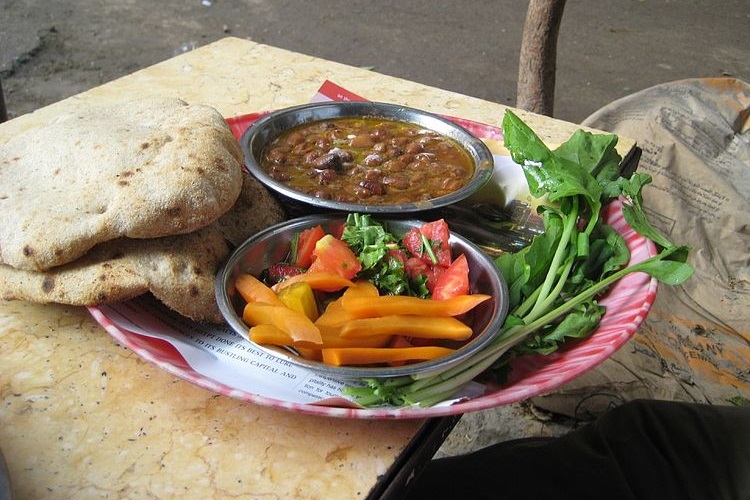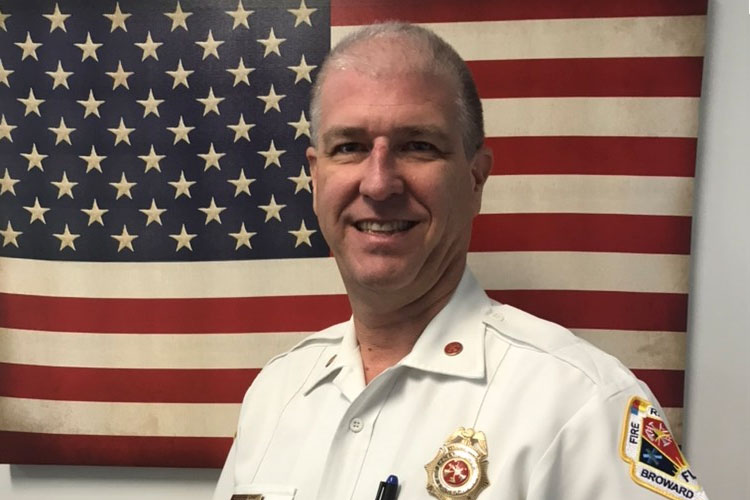

A typical fūl medames Mediterranean-style breakfast, with bread and pickled vegetables and fresh rocket leaves on the side. (Photo by Zachbe.)
By Todd J. LeDuc
Recently, I had the privilege of speaking at the International Association of Fire Chief’s (IAFC’s) first-ever International Fire Operations conference in the Kingdom of Bahrain in the Middle East. This represented a historic milestone for global knowledge sharing and was the first time in the IAFC’s 145-year history that an international conference was held. I joined numerous fire service colleagues from around the globe who spoke at this event. In addition to the United States, South Africa, South Korea, and the United Kingdom were represented.
After three days of knowledge sharing among attendees and presenters, many echoed the comment that the global fire service has more similarities than differences; firefighters are firefighters, wherever they are.
I also had the good fortune of presenting a data-driven and evidence-based overview of occupational health threats and risks to firefighters and the fire service, called “Surviving the Fire Service.” The presentation focused on what I have coined the “three-legged stool” of occupational threats to the American fire service: occupational cancers, cardiovascular disease, and behavioral health threats. Although I covered each of these items in as much depth as is possible in 90 minutes, our occupational health research community has provided an incredible amount of research and body of science that we now have in each of these areas.
One of the three occupational threats I discussed was the role in which obesity plays in contributing to heart disease; metabolic syndrome; and the dynamics of elevated glucose, abdominal girth, and elevated cholesterol/blood pressure. Research has also provided linked obesity with contributing to certain types of cancers. In fact, the PHLAME (Promoting Healthy Lifestyles: Alternative Models’ Effects) study has demonstrated that American firefighters gain, on average, close to three pounds annually. Over the course of a fire service career, that is a large weight gain, which certainly impacts our health status. An additional study, the Fuel2Fight study, also demonstrated significant levels of obesity in United States fire departments that had not yet addressed health-and-wellness programs.
After the day of presentations concluded, attendees had the opportunity to interact with each other in a more casual atmosphere along the shores of the Arabian Gulf. During my conversation with one fire service colleague from the United States, he noted that we had been eating a lot of food during the week of the conference that seemed non-“Western”; it was more of a regional cuisine (but still of high quality). He also observed that most conference attendees were firefighters from the Gulf States who looked very lean and fit, possibly attributed to their dietary habits.
In fact, much evidenced-based research has been done on the benefits of a Mediterranean diet for enhancing cardiovascular health and wellness, weight control, and overall protective health benefits. Compare this to our more traditional Western-based diet, which historically has been laced with such stables as sugars, processed foods high in sodium, and white and heavy starches. In comparison, the Mediterranean diet is focuses more on lean proteins, vegetables, beans, nuts, extra virgin olive oil, and foods that are not high in sugars and processed carbohydrates.
The Harvard University Chan School of Public Health has been working for some time with funding from the Federal Emergency Management Agency (FEMA)/Department of Homeland Security’s Research & Development grant program to evaluate the effect of a more Mediterranean-style diet on the American fire service. They have focused their work on the Indianapolis (IN) Fire Department, evaluating not just how best to implement a cultural shift with food in our fire houses but also to have it welcomed and embraced.
In my department, Broward County (FL) Fire Rescue, we have worked with a staff nutritionist and our Regional Health Planning council to create awareness and education within our stations and members on the effect of their nutrition decisions have not only on their overall health and but also on disease prevention and their fireground performance.
Firefighters have been called “tactical athletes,” meaning that the tasks they are expected to perform requires stamina and metabolic levels at the same level of professional sports athletes. We created a similar signage that is easy to understand and made aware of regarding health-smart food choices we call “Go (green), Slow (yellow), and Whoa (red).” In short, common food types are listed under “green,” “yellow,” and “red”; green is preferred, yellow is for limited moderation, and red to be avoided! Figure 1 shows an example of the station poster.
Nutritionist and physiologists have said that you cannot outrun a bad diet. Although metabolic and strength fitness is essential for the performance levels at which firefighters need to perform, we must also focus on our nutritional habits. Remember, when you hit the fireground, your risks become everyone’s risks.
 Todd J. LeDuc, MS, CFO, FIFirE, is an executive assistant chief with and a 28-year veteran of Broward County (FL) Fire Rescue, an internationally accredited career metro department. He has a master’s degree in executive fire service leadership, is a credentialed chief fire officer, and is a Fellow in the Institute of Fire Engineers. LeDuc is a peer reviewer for professional credentialing and agency accreditation. He speaks and publishes articles frequently; serves on numerous editorial and advisory boards; and has conducted more than 50 fire department evaluations, master and strategic plans, and feasibility studies on three continents. He can be reached at tjlbcems@aol.com.
Todd J. LeDuc, MS, CFO, FIFirE, is an executive assistant chief with and a 28-year veteran of Broward County (FL) Fire Rescue, an internationally accredited career metro department. He has a master’s degree in executive fire service leadership, is a credentialed chief fire officer, and is a Fellow in the Institute of Fire Engineers. LeDuc is a peer reviewer for professional credentialing and agency accreditation. He speaks and publishes articles frequently; serves on numerous editorial and advisory boards; and has conducted more than 50 fire department evaluations, master and strategic plans, and feasibility studies on three continents. He can be reached at tjlbcems@aol.com.
Behavioral Wellness: The Unseen Occupational Realities
Decon Procedures and Firefighter Health
Be Nice: The Fire Service, Harassment, and Bullying

